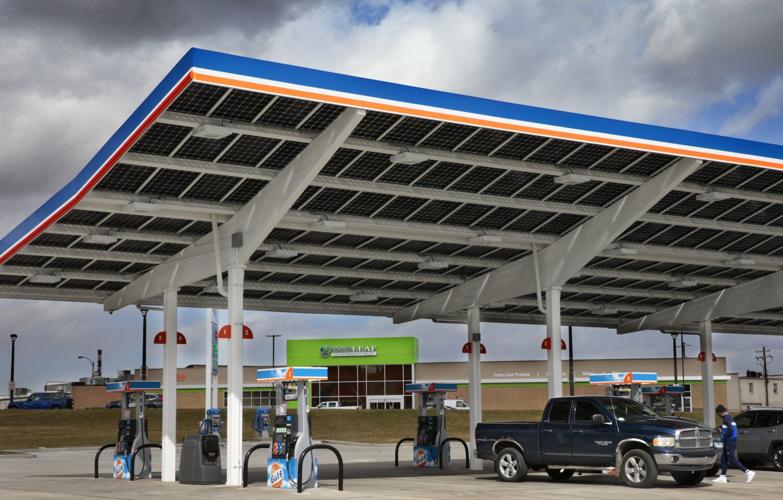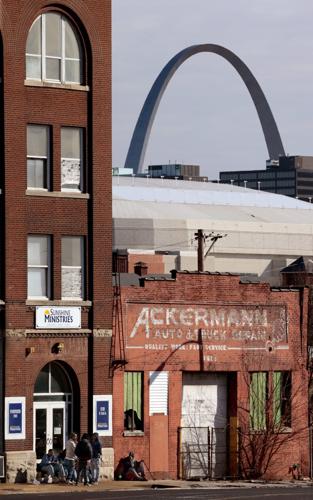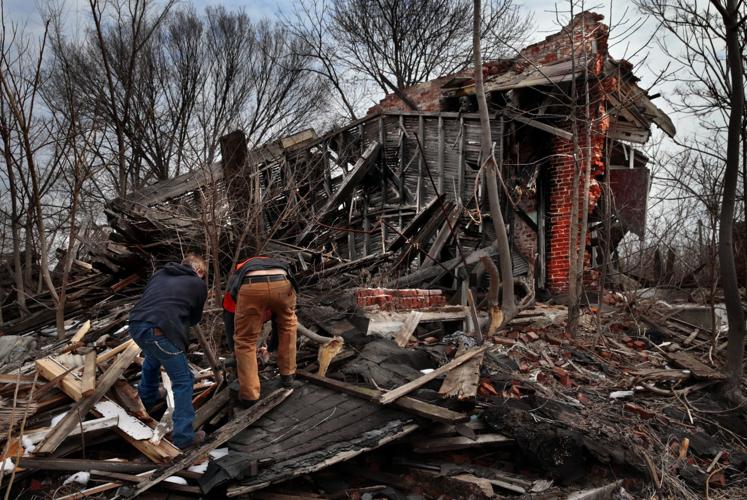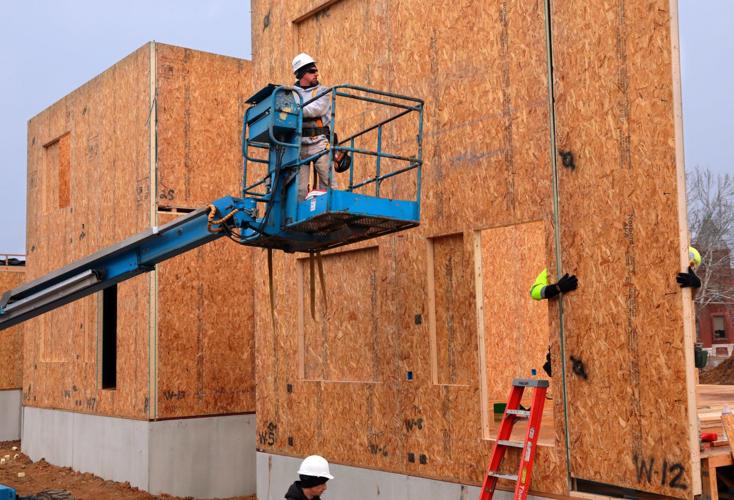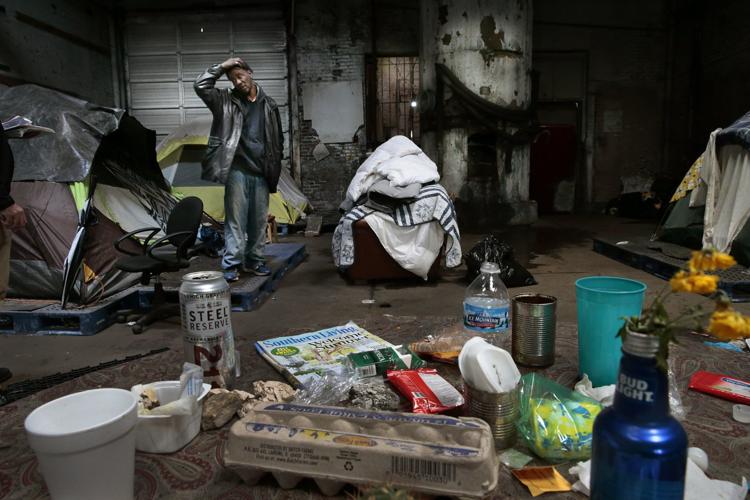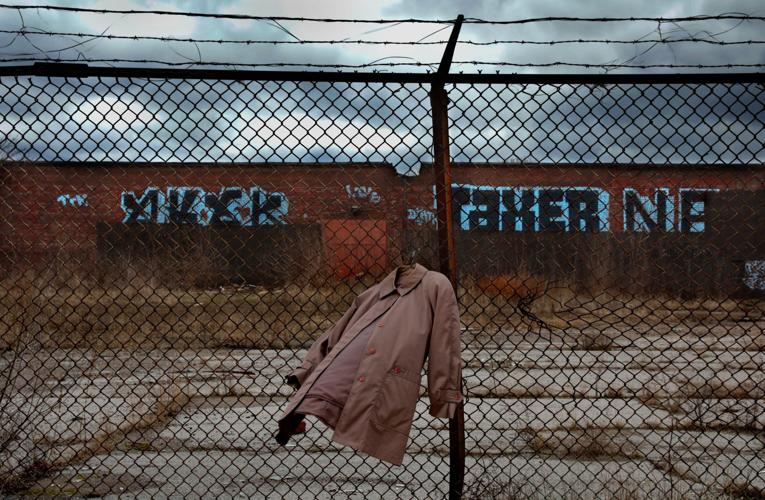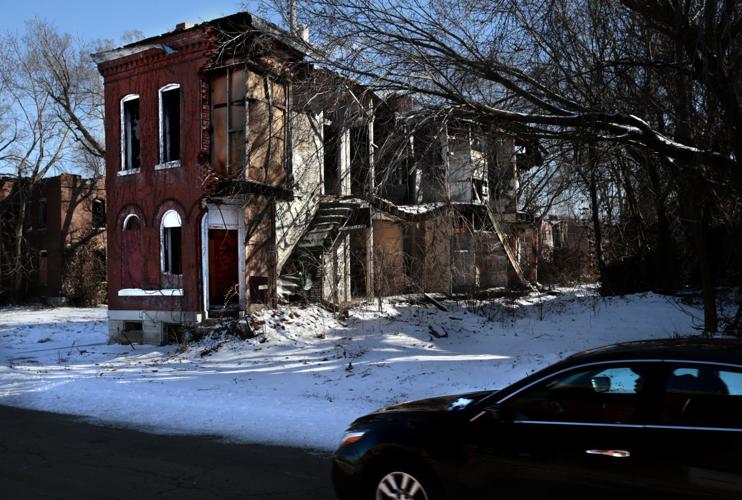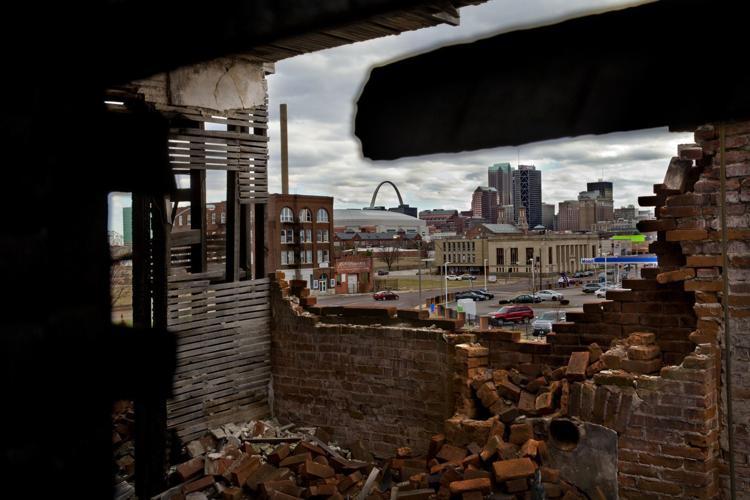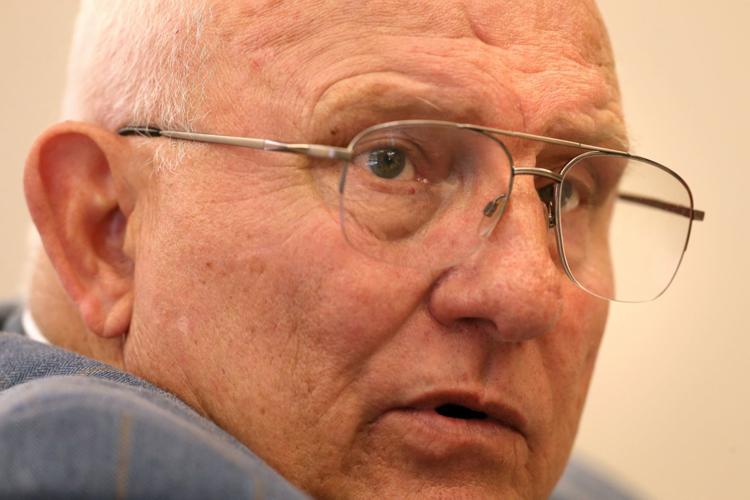ST. LOUIS ŌĆó┬ĀIt has been a messy divorce.
At City Hall, officials had lost faith that Paul McKee could finance the projects he promised, and┬Āallegations of state tax credit fraud, which surfaced last spring, were the final straw.
From McKeeŌĆÖs perspective, Mayor Lyda KrewsonŌĆÖs administration was pushing him out just as the land assemblage he began in north ├█č┐┤½├Į 15 years ago was about to bear fruit with┬Āthe $1.75 billion National Geospatial-Intelligence Agency facility┬ĀŌĆö a project even a top city official conceded would not have materialized without McKeeŌĆÖs making the initial pitch.
People are also reading…
The city made the breakup official in June, scrapping the 2009 agreement that gave McKeeŌĆÖs NorthSide Regeneration control over 1,500 acres of north ├█č┐┤½├Į and rights to hundreds of millions of dollars in potential development subsidies.
And yet, Paul McKee is not gone.

Developer Paul McKee
Photo by Christian Gooden, cgooden@post-dispatch.com
The developer still owns more than 1,600 properties ŌĆö more than 200 acres ŌĆö surrounding the site of the future NGA campus. A lawsuit Bank of Washington filed after the city terminated McKeeŌĆÖs development rights, accusing the city of not adhering to a subsequent agreement giving him more time to begin projects, is pending.
Even if the city prevails in that lawsuit, NorthSide Regeneration, Bank of Washington and their team of lawyers from Stone, Leyton & Gershman will still hold considerable sway over the future of the neglected neighborhoods just north of downtown ├█č┐┤½├Į.
Except for the vacant Pruitt-Igoe site, which McKee owns, there are almost no large, contiguous parcels in the area surrounding the NGA. That means people who want to develop big projects near the NGA will almost certainly have to work with McKee and the bank.

Illinois scrappers cut a metal pipe from the remains of an unrecognizable four-family flat at 2629-31 Hebert Street on Thursday, March 7, 2019. The property is owned by NorthSide Regeneration and sits in the Jeff-Vander-Lou neighborhood. Photo by Robert Cohen, rcohen@post-dispatch.com
Meanwhile, most of the properties NorthSide owns continue to decay, dragging down the value and living conditions of the area even as the NGA holds the potential for a resurgence.
Few of those structures are salvageable, a far cry from the 152 rehabs McKee promised in a 2013 plan submitted to the city. More than 200 of NorthSideŌĆÖs properties have been condemned by the city; many, unsecured and abandoned, have simply crumbled. The historic Clemens House, which McKee once promised to renovate and turn into senior apartments,┬Āburned in the summer of 2017.
McKee, in response, points to signs of new investment: the $19.6 million Zoom gas station and GreenLeaf Market grocery on North Tucker Boulevard, as well as a partnership with a builder constructing several energy-efficient houses in the ├█č┐┤½├Į Place neighborhood. The gas station opened in October; the grocery opens next month.
ŌĆ£I do think that NorthSide has already produced remarkable results ŌĆśbeyond GreenLeafŌĆÖ by bringing NGA to north ├█č┐┤½├Į,ŌĆØ McKee said in a statement to the Post-Dispatch. ŌĆ£I canŌĆÖt help but express some frustration that this extraordinary success seems to get lost in the discussion.ŌĆØ

A Zoom gas station and GreenLeaf grocery store, two projects of Paul McKee's NorthSide Regeneration, were built on Tucker Boulevard just south of the Stan Musial Veterans Memorial Bridge, photographed on Thursday March 14, 2019. The gas station opened in October 2018 and the grocery store opens in April. Photo by Robert Cohen, rcohen@post-dispatch.com
He said that the lawsuit limited what he could say but that he looked forward ŌĆ£to a future where the cityŌĆÖs litigation does not interfere with redevelopment of this long suffering area.ŌĆØ
Bank of Washington CEO L.B. Eckelkamp Jr. said heŌĆÖd ŌĆ£love to see the fences mendedŌĆØ between City Hall, his bank and NorthSide but maintained that the city improperly ended the development agreement.
Going forward, he said, the bank is open to lending to other projects in the area depending on the proposal. ŌĆ£ThereŌĆÖs nothing that prevents us from lending more.ŌĆØ
There are few examples of large-scale investment in the cityŌĆÖs beleaguered north side, and McKeeŌĆÖs defenders say heŌĆÖs been unfairly attacked for being the outlier who has actually tried to tackle such a difficult endeavor.
But a top ├█č┐┤½├Į development official said that as new information came out in┬Āa 2018 eminent domain trial┬Āthat gave city attorneys access to some of NorthSideŌĆÖs private records, it became clear that the developer did not have the money to make his dream a reality.
A series looking at the consequences of decades of disinvestment in ├█č┐┤½├Į. See all related stories at┬Āstltoday.com/tippingpoint
There had been signs for years: Requests for more development incentives. A lender pulling out of the grocery store deal. A stalled logistics park in Hazelwood. A failed bank that lent to McKee. No progress on a housing development despite interest from a national developer and a union investment fund.
ŌĆ£What we want to see is, and be able to talk to, are developers who can actually get the work done,ŌĆØ Otis Williams, director of the ├█č┐┤½├Į Development Corp., said in an interview last month. ŌĆ£We realized there just wasnŌĆÖt the amount of wherewithal ŌĆö I call it wherewithal ŌĆö financial capability there for the development to move ahead.ŌĆØ
ŌĆśGiant vacuumŌĆÖ
In 2009, when the city inked its development deal with McKee, no one else was proposing anything on that scale for north ├█č┐┤½├Į. The city gave him a shot. The state gave him $43 million in tax credits through a special program his lawyers helped write.
ItŌĆÖs hard to know how much NorthSide and the bank have invested in total. In a 2013 letter to state officials, McKee said he had advanced $20 million of his own funds into buying land for NorthSide and guaranteed another $45 million from lenders.
Bank of Washington, in a letter to then-Mayor Francis Slay during the 2015 negotiations for the NGA land, said it and McKee had invested ŌĆ£well in excess of $50 million to establish site controlŌĆØ of the NorthSide area. Including debt on the property in the NGA area, an acre should sell for about $261,000, Eckelkamp wrote the city in 2015.
There are other liens encumbering pieces of NorthSideŌĆÖs land, too. In 2016, when McKee exercised his $1 million option to buy the 34-acre Pruitt-Igoe site from the city, two private companies ŌĆö Jefferson & Cass Capital Investors LLC and Scarboro Services LLC ŌĆö entered into financing arrangements with one of his companies. In real estate documents, Howard Smotkin, a lawyer with Stone, Leyton & Gershman, signed on behalf of Scarboro Services and Jefferson & Cass Capital Investors. The companiesŌĆÖ only addresses are a post office box and the firmŌĆÖs office.
Smotkin said the firmŌĆÖs lawyers were not investors in the project but were not authorized to comment about the limited liability companies involved in the transaction.
With debt piled onto the land and Bank of Washington looking to be repaid, the immense power the city granted to McKee by selling him more than 100 acres from its land bank in 2012 canŌĆÖt just be taken away by canceling development rights. Williams said ŌĆ£itŌĆÖs a work in progressŌĆØ to make sure there was a way to assemble land and work with developers ŌĆö including NorthSide ŌĆö who had workable development proposals.
ŌĆ£I think our lesson is that carving out and putting that much territory into one development agreement is probably a mistake,ŌĆØ Williams said. ŌĆ£The tools that are used in large developments are good, but we understand now, and what we will do in the future, is have smaller areas and work with developments that are smaller in size, particularly with just a private developer. Where there are institutions and secured financing already in place, we might look at something like that. But with just an ordinary private developer who has visions, I think we would look at a smaller area.ŌĆØ
Because of an underfunded planning department, and a comprehensive plan for ├█č┐┤½├Į only now being drafted, critics point to the chapter as the epitome of reacting to developer proposals.
ŌĆ£This is what happens after years of no planning,ŌĆØ said Sarah Coffin, professor of urban planning and development at ├█č┐┤½├Į University. ŌĆ£ThereŌĆÖs this giant vacuum that is open to anyone to step into, especially when there are no guidelines for development.ŌĆØ
At the state level, the Missouri Department of Economic Development has expressed concern at how McKee used some of the $43 million in tax credits he received. The Missouri attorney generalŌĆÖs office has a pending lawsuit accusing NorthSide of tax credit fraud.
ŌĆ£The purpose for this was to redevelop it, was to provide an opportunity for redevelopment to occur, and thatŌĆÖs where the public gains benefit,ŌĆØ Sallie Hemenway, a former DED official, testified at the eminent domain trial in May. ŌĆ£The public gains no benefit from an individual private person gaining access to their tax dollars that could otherwise go to other places to just simply put land in his or her own name.ŌĆØ
Michael Allen, an architectural historian┬Ā┬Āmore than 12 years ago that┬ĀMcKee was behind the mystery companies buying up property in north ├█č┐┤½├Į, gave credit to KrewsonŌĆÖs administration for taking the first steps to unwind the development agreement. But thereŌĆÖs still a long way to go.
ŌĆ£In some ways, itŌĆÖs better now,ŌĆØ Allen said. ŌĆ£But find three blocks in a row there that he doesnŌĆÖt own property on. ... The capacity for the market to absorb McKeeŌĆÖs land at the price he wants to sell it is low, I think.ŌĆØ
McKee said NorthSide ŌĆ£has never been about land speculation, and still is not.ŌĆØ He is ŌĆ£just getting started,ŌĆØ and future projects will be ŌĆ£even more groundbreaking.ŌĆØ But he expects the city will oppose the jobs and investment he proposes, so he declined to provide details.
ŌĆ£Neither (NorthSide) nor Bank of Washington is or will be satisfied to sit on their laurels in the hope that those who long ignored north ├█č┐┤½├Į will now invest,ŌĆØ McKee said in written response to questions. ŌĆ£We intend to move our redevelopment forward.ŌĆØ
ŌĆśBilling him dailyŌĆÖ
While it awaits that promised redevelopment, the city has begun liberally using one of the only tools it has to prod landowners into putting their real estate into productive use.
Since last year, the city has billed NorthSide $154,000, mostly for vacant building fees but also for several demolitions, according to information from the Building CommissionerŌĆÖs office. Vacant property fees can be added to the real estateŌĆÖs tax bill. ThereŌĆÖs thousands more billed for code violations.
ŌĆ£WeŌĆÖre billing him daily,ŌĆØ said Deborah Williams, a manager who handles vacant property in the building commissionerŌĆÖs office. ŌĆ£WeŌĆÖre not done.ŌĆØ
Until aldermen and Krewson acted to change it last year, an ordinance barred the city from fining properties within a development agreement area for code violations.
Since the end of 2018, the ├█č┐┤½├Į Building Division has filed six court actions seeking fines from NorthSide Regeneration for code violations on properties it owns. NorthSide has paid most of the fines, usually less than $1,000. Matt Moak, who handles problem properties in the city counselorŌĆÖs office, said the city was treating McKee just like any other property owner now.
ŌĆ£We are now seeing cases starting to come towards us,ŌĆØ Moak said. ŌĆ£They are just starting.ŌĆØ
Whether that prods McKee into moving more quickly remains to be seen.
But in the last nine months, at least one person┬Āhas managed to reach a deal with him.
In July, Dwight Arant purchased five lots from McKee on Montgomery Street for $100,000.
ŌĆ£I donŌĆÖt buy into any of these things about the land value being high that heŌĆÖs asking,ŌĆØ Arant said.
ArantŌĆÖs NetZero company is building three model homes that he said would be so energy efficient that owners wouldgenerate enough electricity from solar panels to meet all their power needs. The ├█č┐┤½├Į-Kansas City Carpenters Regional Council loaned his NetZero $500,000 in January to begin building the homes. McKee said that it was ŌĆ£only the beginning for the areaŌĆØ and that he had sold the land for less than the industry standard.

Andy Steiert (top) of R.T. Construction builds a model home, one of three under construction for the new Saint Louis Park Place development at the intersection of 20th and Montgomery streets on Friday, March 1, 2019. Developer Dwight Arant started work last month on the trio after buying several lots from developer Paul McKee of NorthSide Regeneration. Photo by Robert Cohen, rcohen@post-dispatch.com
McKee is ŌĆ£a really hard-nosed negotiator,ŌĆØ Arant said, but he contends that if ŌĆ£you went anywhere else and paid what I paid for a lot, you would be getting a steal.ŌĆØ Arant said he had options for 250 more lots to build out housing in the area around the NGA.
ŌĆ£A little more for the land doesnŌĆÖt matter if thatŌĆÖs what it takes to get a community started,ŌĆØ Arant said. ŌĆ£There are no comps (comparable sales). ItŌĆÖs like the Wild West.ŌĆØ
But others have said they couldnŌĆÖt reach deals with McKee.┬Ā, a nonprofit that promotes urban gardening, tried to buy two sites from NorthSide for a new headquarters, its executive director said, but couldnŌĆÖt reach an agreement. The Missouri Department of Transportation had to initiate eminent domain action against NorthSide in 2010 to obtain right of way near the foot of the new Stan Musial Veterans Memorial Bridge.
Old North residents, who have worked to stabilize a NorthSide neighborhood with scattered rehabs and block-by-block projects, have long complained that McKee wonŌĆÖt sell land he owns in their neighborhood despite the fact that it was never included in the NorthSide Regeneration redevelopment area approved by the city.
ŌĆ£ThereŌĆÖs been people whoŌĆÖve been interested in different property and he wonŌĆÖt relinquish it,ŌĆØ Old North resident Paulette Sankofa said. ŌĆ£Once people find out McKee owns it, they just say ŌĆśForget it.ŌĆÖŌĆØ
Old North Saint Louis Restoration Group President Jessica Payne said the neighborhood was talking to McKee about putting together a land swap to gain control of some of the buildings he owned in Old North. They even had the cityŌĆÖs land bank, the Land Reutilization Authority, on board to help come up with properties to give McKee in exchange. SheŌĆÖs not sure why, but NorthSide representatives stopped communicating suddenly. McKee accused the LRA of torpedoing the agreement.
ŌĆ£They were lived in when he bought them,ŌĆØ Payne said of the now vacant, deteriorating houses. ŌĆ£WeŌĆÖd love to see them preserved as he promised heŌĆÖd do in the beginning.ŌĆØ
, a nonprofit that works with the homeless north of downtown, has managed to reach a deal with McKee over the years. He owned one of the parcels on the site where Sunshine built its new menŌĆÖs shelter.
ŌĆ£It was more than I paid for all the other parcels,ŌĆØ said Carol Clarkson, Sunshine Ministries director. ŌĆ£But I needed it.ŌĆØ

People gather in front of the old Sunshine Ministries building at 1520 N. 13th Street on Monday, March 11, 2019. Next door at 1514 is an abandoned car and truck repair business owned by NorthSide Regeneration which was used as a homeless tent community until the interior was gutted by fire last month. The city later boarded up the building. Photo by Robert Cohen, rcohen@post-dispatch.com
Years ago, she was looking at another property he owned on North Florissant Avenue. The price he asked seemed well above market, and she didnŌĆÖt go through with the deal.
ŌĆ£I know itŌĆÖs inflated,ŌĆØ she said McKee told her. ŌĆ£But I want to make sure I keep my comps up.ŌĆØ
Now, he owns property all around Sunshine Ministries. ItŌĆÖs making it difficult for the nonprofit to sell a building it no longer needs. Next door to it, a McKee-owned property that has become a refuge for the homeless caught fire last month.
ŌĆ£Everything around me is owned by McKee,ŌĆØ Clarkson said. ŌĆ£IŌĆÖm this little island. ... He does nothing to secure his property to keep my property safe.ŌĆØ
McKee said that nonprofits often had limited resources for real estate transactions and that his land was available for purchase at ŌĆ£fair market value.ŌĆØ

Tim Farr gets ready to leave a homeless tent community inside an abandoned car and truck repair shop at 1514 N. 13th Street and owned by NorthSide Regeneration, on Wednesday, Oct. 31, 2018. A fire last month gutted the interior of the building and the city boarded it up. The building is next door to the old Sunshine Ministries. Photo by Robert Cohen, rcohen@post-dispatch.com
ŌĆ£I would be ill-advised to chill interest in north ├█č┐┤½├Į by demanding inflated prices, and Bank of Washington would not tolerate such a reckless approach,ŌĆØ he said.
├█č┐┤½├Į Place Community Association President Brian Krueger is still bullish on the area, even with McKee and City Hall at loggerheads. His landŌĆÖs value has already jumped, he said.
ŌĆ£IŌĆÖm not counting Paul McKee out,ŌĆØ he said. ŌĆ£DonŌĆÖt ever count him out.ŌĆØ
Buyers who canŌĆÖt reach a deal with McKee ought to go straight to Eckelkamp, Bank of Washington chief executive, he said.
ŌĆ£If a developer was serious about wanting a chunk of that land, go to the Bank of Washington, cut Paul out, let them know youŌĆÖre a player,ŌĆØ Krueger said. ŌĆ£I canŌĆÖt think theyŌĆÖre in the business of saying no.ŌĆØ
ŌĆśStill talking about himŌĆÖ
Maybe, if McKee had started buying property 10 years earlier ŌĆö long before the 2008 financial crisis helped tank the economy ŌĆö his dream of turning around an old, struggling section of the city could have become a reality, said Allen, the architectural historian who has followed the saga.
ŌĆ£ItŌĆÖs a beautiful dream,ŌĆØ Allen said. ŌĆ£ItŌĆÖs hard not to want that.ŌĆØ
But he doesnŌĆÖt think McKee is going to let go.
ŌĆ£Time has always served McKee pretty well,ŌĆØ Allen said. ŌĆ£He still owns the land. WeŌĆÖre still talking about him. He hasnŌĆÖt given up.ŌĆØ
The city says that itŌĆÖs open to reaching a resolution on the lawsuits and that it would still work with NorthSide if the developer presented workable projects.
In the meantime, officials are focusing on what they can control: infrastructure improvements along Jefferson and Cass avenues to prepare for the expected influx of 3,000-plus NGA workers.
And that is still more than five years away.
Janelle OŌĆÖDea and Andrew Nguyen of the Post-Dispatch contributed to this report.
NorthSide Regeneration stalls as buildings crumble
NorthSide owns this abandoned warehouse on 13th Street

Clothing hangs in front of an abandoned warehouse owned by NorthSide Regeneration at 1600 N. 13th Street, on Wednesday, Feb. 20, 2019. The Columbus Square neighborhood located just north of downtown, consists of several warehouses and the old Greyhound bus station that are frequently visited by the homeless. Photo by Robert Cohen, rcohen@post-dispatch.com
Building on 14th Street, burned years ago, slowly disintegrates

The second floor of a two-family home at 1604 N. 14th Street, owned by Paul McKee's NorthSide Regeneration, crumbles over downtown ├█č┐┤½├Į on Tuesday, March 14, 2019. Photo by Robert Cohen, rcohen@post-dispatch.com
An entire wall is missing, but the building still stands

The entire west-facing wall is missing from a NorthSide Regeneration owned house at 2714 N. Market Street on Monday, March 4, 2019 in the Jeff Vanderlou neighborhood. Photo by Robert Cohen, rcohen@post-dispatch.com
McKee, city applaud NGA's headquarters announcement

Developer Paul McKee (center) applauds as high-ranking politicians from Missouri hold a press conference in ├█č┐┤½├Į on Friday, April 1, 2016 celebrating the announcement that ├█č┐┤½├Į was chosen as the site to build the new western headquarters for the National Geospatial-Intelligence Agency. McKee owns many of the parcels of land that are in the proposed footprint of the NGA site and many other nearby properties just outside the NGA footprint. Photo By David Carson, dcarson@post-dispatch.com
The homeless find refuge in NorthSide-owned vacants

Tim Farr gathers gas for a generator and another blanket as he returned to a homeless tent community inside an abandoned car and truck repair shop at 1514 N. 13th Street and owned by NorthSide Regeneration, on Wednesday, Oct. 31, 2018. A fire last month gutted the interior of the building and the city boarded it up. The building is next door to the old Sunshine Ministries. Photo by Robert Cohen, rcohen@post-dispatch.com
Scrappers salvage metal from collapsed NorthSide property

Illinois scrappers remove any metal remains from an unrecognizable four family flat at 2629-31 Hebert Street owned by NorthSide Regeneration in the Jeff-Vander-Lou neighborhood on Thursday, March 7, 2019. Photo by Robert Cohen, rcohen@post-dispatch.com
Decades of history revealed as layers peel away

Peeling paint and wallpaper reveal decades of history inside a house with a missing exterior wall at 2714 N. Market Street on Thursday, Feb. 28, 2019. The crumbling home in the Jeff-Vander-Lou neighborhood is owned by NorthSide Regeneration. Photo by Robert Cohen, rcohen@post-dispatch.com
The second floor crumbles on this 14th Street property

The second floor of a two-family home at 1604 N. 14th Street, owned by Paul McKee's NorthSide Regeneration, crumbles over downtown ├█č┐┤½├Į on Tuesday, March 14, 2019. Photo by Robert Cohen, rcohen@post-dispatch.com
Homeless community finds shelter in NorthSide property

Tim Farr gets ready to leave a homeless tent community inside an abandoned car and truck repair shop at 1514 N. 13th Street and owned by NorthSide Regeneration, on Wednesday, Oct. 31, 2018. A fire last month gutted the interior of the building and the city boarded it up. The building is next door to the old Sunshine Ministries. Photo by Robert Cohen, rcohen@post-dispatch.com
Boarded-up window on a NorthSide property secured by ivy

Dormant ivy solidifies an already boarded up window of a NorthSide Regeneration abandoned home at 1820 N. Leffingwell Avenue in the Jeff-Vander-Lou neighborhood on Thursday, Feb. 28, 2019. Photo by Robert Cohen, rcohen@post-dispatch.com
Exposed interior walls of NorthSide-owned building deteriorate

Paint peels from the wall of a house with a missing exterior wall at 2714 N. Market Street on Thursday, Feb. 28, 2019. The crumbling home in the Jeff-Vander-Lou neighborhood is owned by NorthSide Regeneration. Photo by Robert Cohen, rcohen@post-dispatch.com
McKee said he'd rehab the Clemens House. It burned instead.

├█č┐┤½├Į firefighters use aerial hoses to knock loose brick from the facade of the Clemens House on Cass Avenue after it caught fire early Wednesday, July 12, 2017. The historic home, built by James Clemens Jr., the uncle of Mark Twain, was destroyed along with a chapel and expanded property. Following Clemens' death, the Sisters of St. Joseph added the chapel. Photo by Robert Cohen, rcohen@post-dispatch.com
After it burned, little was left of the historic Clemens House

Jim Meiners (left) of the City Museum and Carlos Mendoza remove an 800-pound cast iron window frame containing image of Eliza Clemens, from the Clemens House in the 1800 block of Cass Avenue on Monday, Feb. 12, 2018. The house, built by James Clemens (a relative of Mark Twain) as a tribute to his wife, burned last July. Staff members from the museum, which collects historic ├█č┐┤½├Į architecture, are removing the cast iron structures before its upcoming demolition. Photo by Robert Cohen, rcohen@post-dispatch.com
Cleaning the site of the future NGA western headquarters

A laborer cleans trash from the new site of the National Geospatial-Intelligence Agency as an abandoned liquor store owned by NorthSide Regeneration stands on its border at 2129 Madison Street on Friday, March 1, 2019. Photo by Robert Cohen, rcohen@post-dispatch.com
A model home under construction at Saint Louis Park Place

FILE PHOTO: Andy Steiert of R.T. Construction builds a model home, one of three under construction for the new Saint Louis Park Place development at the intersection of 20th and Montgomery streets on Friday, March 1, 2019. Developer Dwight Arant started work last month on the trio after buying several lots from developer Paul McKee of NorthSide Regeneration. Photo by Robert Cohen, rcohen@post-dispatch.com
NorthSide Regeneration stalls as buildings crumble

The second floor of a two-family home at 1604 N. 14th Street, owned by Paul McKee's NorthSide Regeneration, crumbles over downtown ├█č┐┤½├Į on Tuesday, March 14, 2019. Photo by Robert Cohen, rcohen@post-dispatch.com





























